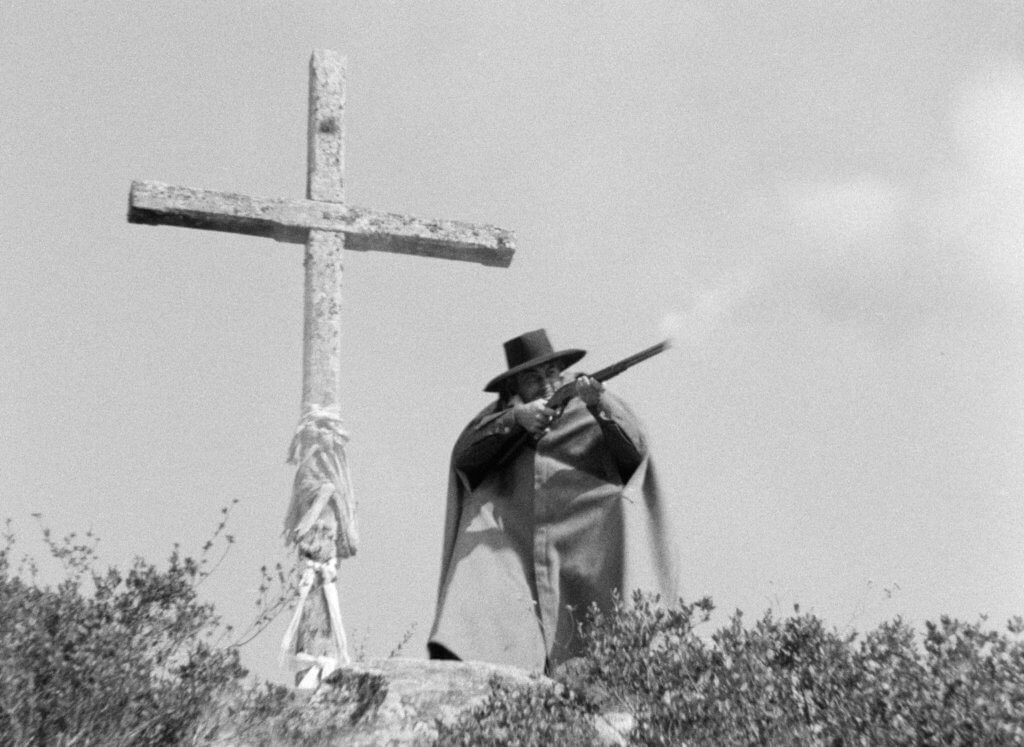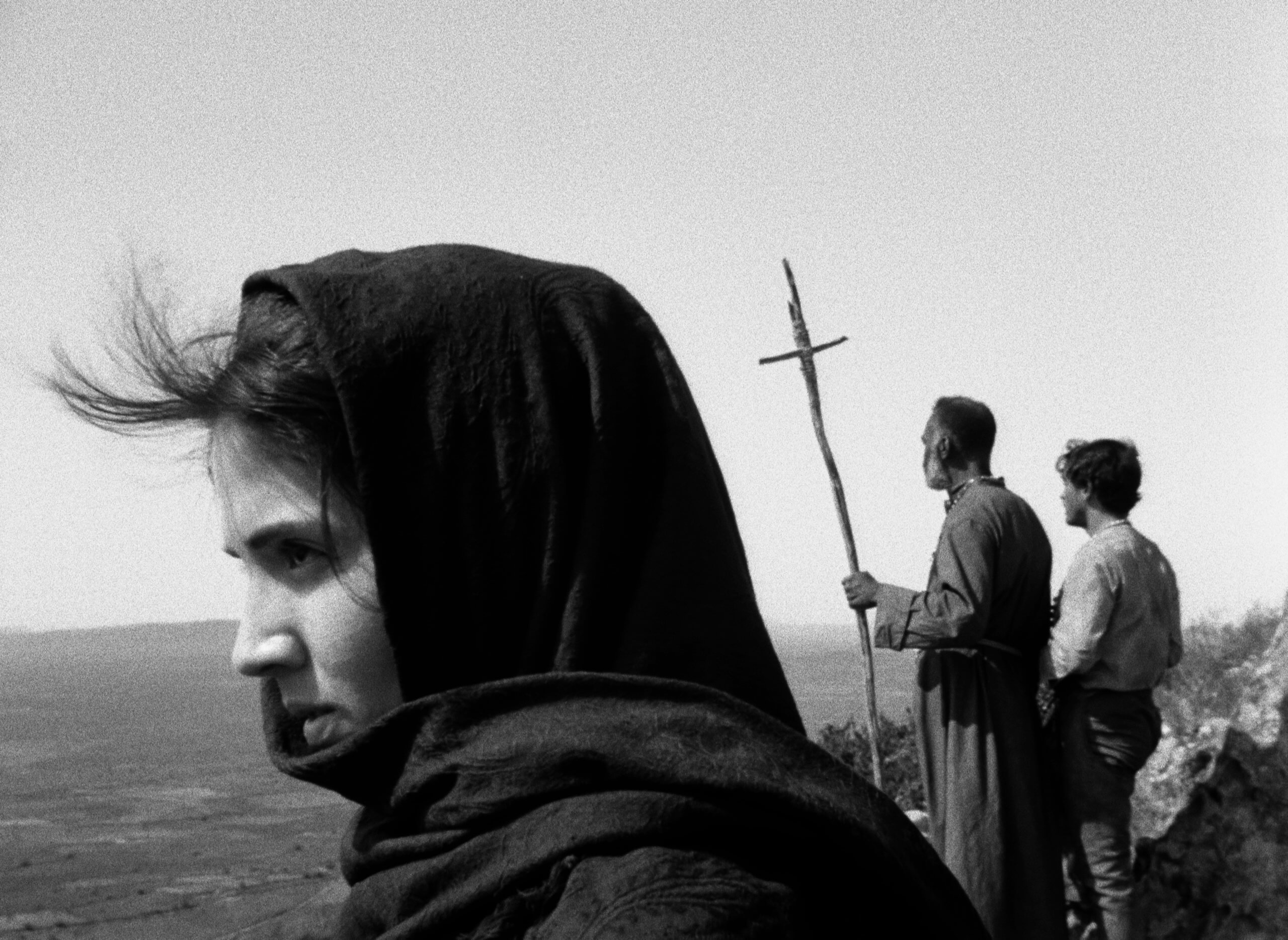Despite taking a class on Brazilian cinema during my undergrad days, I remember little to nothing about Brazil’s cinema novo movement. Still, it doesn’t require prerequisite knowledge to recognize and absorb Black God, White Devil’s arresting images and narrative.
Unpacking Black God, White Devil requires a summary of its story, if such a task is even possible. It may take a while for Black God, White Devil to crystallize, but it reveals itself to be a sprawling web-like network of stories entangled in one another. Starting as a perhaps typical downtrodden neorealist film, with our characters already at zero out of ten, it only gets worse for them: Manuel our protagonist goes on the run after killing an untrustworthy merchant. Pleadingly opposed by his wife Rosa, he joins a cult following a self-proclaimed prophet and saint Sebastião, during which we follow the religious fervor and blindness sweeping across a nation in documentary-like mode. Meanwhile, in a scene from a more classical drama, the traditional Church hires a hitman Antonio das Mortes to take down Sebastião. All of these narratives coalesce in a bone-chilling bloodbath, and we’re only at the midpoint of the movie. The second half introduces a totally new character Corisco, an even more violent man who recruits Manuel under his wing, and the film ventures into the surreal and abstract. Bursts of extreme violence interrupt 10 to 15-minute-long debates on religion and violence, while a rather jolly singing narrator irregularly interjects the film to provide exposition.
How does a director hold together a film like that? As the story relentlessly evolves, so does director Glauber Rocha’s method. He made this film at the prodigious age of 25, and there is youthful energy bursting at the seams. There is the jerkily handheld movement one might expect from the depiction of distress, but it’s contrasted with extreme wide shots of stunning vistas, emphasizing how vast the land and small the people are. His method is not just for visual interest or intent of subversion: during the documentary-like segment, his camera is always on the people instead of the prophet, siding with the people’s victimhood instead of the prophet’s power. He can smartly pack a lot of information and two-shots in his Academy frame, but he can also easily go for almost Eisensteinian quick jump cuts whenever there is a burst of violence. Most awakening of all though is his use of sound, especially music: the score starts with soaring Morricone-esque, ’60s strings, but as the characters’ situation gets direr, gradually transforms into Bach-like, mournful pipe organ. The dialogue weaves in and out of diegesis, and a narrator jumps in intermittently to sing about the story in folk tunes, providing exposition, an omniscient perspective, and a celebration of popular music at the same time.
What impresses this Western-centric viewer the most is the prescience of these filmmaking methods. As the movie innovates in the second half and the characters deliver polemic directly into the camera, it reminds me of Godard’s Weekend (1967), the seminal turning point into experimental film of the Frenchman’s career. As the narrator comments tunefully, it reminds me of the celebrated use of songs in The Graduate (1969) and McCabe & Mrs. Miller (1971). What’s important is that the 1964 Black God, White Devil predates these movies by at least a few years! This shows that cinema has places of breakthrough far from the expected Northern Hemisphere, and that cinema from the other side of the globe can be just as revolutionary and artful. While Americans were still stepping out of the shadows of the Hays Code in the ’60s, the Brazilians were making this.

Despite this array of tricks that never feels ostentatious, what ultimately won me over are the film’s themes. This may have the look and archetypes of a Western, but one must resist this surface-level comparison. I cannot pretend to know what political situation or historical events this movie is alluding or directly referring to. But as Rosa struggles between her husband’s newfound religious fanaticism and her own impiety, at one point asking him to leave this wretched land together, it strangely reminded me of my own background. As a native of Hong Kong who has been witnessing the erosion of the city by tyrannical forces and a growing wave of mass emigration, I too am struggling with “saving” my home or leaving without looking back. The situation is admittedly more critical in 1960s Brazil, but the emotions remain true and poignant. The only religion these characters believe in more than Christianity is violence; they see violence as the only resolution to any problem. I usually reject this kind of pessimism in film, but in this case, I see where it is coming from, and who am I to judge these characters’ and Rocha’s feelings anyway?
There are also sub-themes that reveal a surprisingly progressive film worthy of a dissertation. The relationship between Manuel and Rosa is contentious; sometimes, he has to put on the garb of the macho male, but even more so, he is in deference to his wife. The “Black God” in the title refers to more than the metaphorical: the self-proclaimed prophet is actually Black. How do we unpack this character, who performs some unspeakably violent acts at times, but is also likely a victim of hidden racism and a rebel against institutional religion? And he does provide an appealing alternative to the Church, which is revealed to be almost absurd in its hypocrisy and evil, saying there is “precedent” in the Gospel to kill Sebastião because of Jesus and the traders, while literally providing Antonio with coins to do so. If anything, Black God, White Devil is a reminder to the modern liberal viewer that for many people, religion is not a choice of going to church on Sunday or not; it is a system of oppression and violence that seeps into every corner of society. How can one renounce religion when everyone around them is blinded with zeal?
Messy, polemical, and massively capable but also constantly innovative, Black God, White Devil deserves a place in the canon of masterpieces in world cinema, showing cinema novo to be just as avant-garde as the French New Wave. But the true takeaway is that the avant-garde exists outside of Europe and North America. That is one of the true goals of film restoration: shining a light on systemically overlooked cultures of world cinema and giving them a platform and accessibility equal to the established canon’s. That is particularly true of this film, as the Cinemateca Brasileira has suffered from both ruthless attacks by the Bolsonaro administration and a tragic fire in 2021. This 4K restoration of Black God, White Devil comes at a particularly precious moment, making the film and the situation it depicts once again crystal clear.
